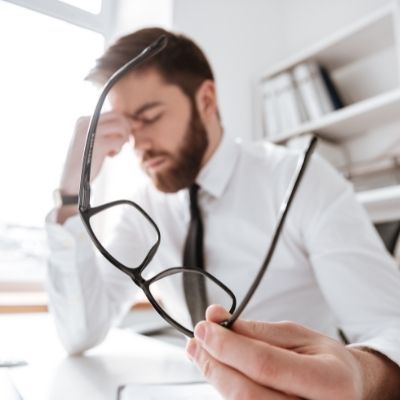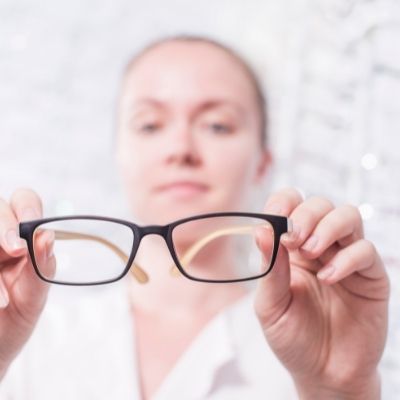If you’ve just started wearing glasses or recently got a new pair, then you may be surprised to learn that they can be uncomfortable in the beginning. Even people who have worn glasses their whole lives may experience trouble with new frames and lenses. To help you know what to expect, we’ve put together the five most common questions about adjusting to new glasses.
The biggest questions we answer are:
- What kind of problems are common when adjusting to new glasses?
- How long does it take to adjust to new glasses?
- What can I do to get used to new glasses more quickly?
- Why do my new glasses cause headaches and dizziness?
- Why do new glasses with the same prescription require an adjustment period?
1. What Kind of Problems Are Common When Adjusting to New Glasses?
There are a number of issues you may experience with a new pair of glasses. Whether it’s a new prescription or simply a new lens shape, both of these factors can result in problems. Fortunately, this adjustment period is often short, allowing you to wear your new glasses in comfort.
Common issues you may experience when adjusting to new glasses include:
- Distortion – everything you see may seem out of focus, wavy, bent, or warped
- Gauging distance – you may have difficulty estimating how near or far objects are
- The fishbowl effect – your vision may seem bent at the edges
- Eye strain – your eyes can feel strained due to the extra work of adjusting to your glasses
When combined, these issues can result in headaches, nausea, and dizziness. While this can be alarming, it’s important that you keep wearing your new glasses. This will help you adjust to them faster and allow you to get over their effects more quickly.
Debating on glasses versus contacts? Check out our blog to learn which is best for you!
2. How Long Does It Take to Adjust to New Glasses?
In most cases, the above problems should go away after a few days. However, the adjustment period can take longer for some people. It’s not unheard of to take up to two weeks to fully adjust to new glasses. What’s important is to know when to contact us so we can make any needed adjustments. This will help your eyes adjust more quickly and ensure they are comfortable.
Contact us immediately if you experience headaches, eyestrain, and distorted vision for longer than a week. Our team at Hardin Valley Eyecare & Optical can reassess your vision to determine if your glasses were made incorrectly or if you received the wrong prescription. This will allow us to provide you with the right glasses so you can see comfortably and confidently.
Click here to read our blog on the latest trends in eyeglass frames!
3. What Can I Do to Get Used to New Glasses More Quickly?
The best thing you can do to help get used to your new glasses is to wear them. This means putting them on every morning as soon as you get up and continue wearing them throughout your day. By constantly wearing your new glasses, you will help your eyes adjust to the new lenses and adapt to them more quickly.
It’s important to not switch back to your old glasses if you experience issues such as distortion, eye strain, or the fishbowl effect. While they may be more comfortable, switching to your old glasses will only slow the adjustment process. Wearing your new frames like you normally would is the best way to ensure that you get used to them as fast as possible.
4. Why Do My New Glasses Cause Headaches and Dizziness?
Your eyes and brain have to put in some overtime as you adapt to your new prescription eyeglasses. This can cause your eyes to strain more than usual, which can lead to headaches. This is normal on the first day of wearing them. However, contact our office if it lasts longer than a week so we can check them and make any necessary adjustments.
Dizziness or nausea from new glasses is usually a problem with depth perception. When this occurs, you’re actually experiencing motion sickness. You were used to your old glasses which contributed to a natural understanding of your body and spatial awareness. New glasses can disturb this awareness and lead to short-term dizziness as you adjust.
5. Why Do New Glasses with the Same Prescription Require an Adjustment Period?
It may seem odd, but you may still need to adjust to new glasses that have the same prescription as your old ones. There are a couple of reasons why this happens:
- Different lenses
- Different frames
While your prescription has remained the same, these factors can still affect your eyes.
Different lenses affect how your eyes see through them. This could be due to getting thinner lenses or switching to a new type of lenses such as bifocals or progressives. Different frames can affect the curvature, size, and shape of your lenses. Switching from small rectangular lenses to round oversized lenses can affect how you see and require an adjustment period.
Are you in the market for a new pair of glasses? Contact us today to schedule your appointment!
Adapting to a new pair of glasses requires time and patience. Your eyes need time to adjust so that they’re as comfortable as your last pair. However, there are times when you should contact our office. Call us immediately if you experience any problems for longer than two days so we can check your new glasses and your prescription.
Hardin Valley Eyecare & Optical has been serving Knoxville since 2009. Dr. Travis Thompson and Dr. Catherine Abbott specialize in the diagnosis and treatment of a wide array of eye diseases, conditions, and problems and are committed to improving the quality of life in the Knoxville community through enhanced vision. Located at 10904 Spring Bluff Way, you can schedule an appointment online or give us a call at (865) 888-0892.





